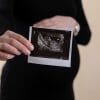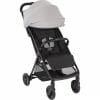Parenting
Reflections Of A Mother Who Chose IVF In Alabama
My partner and I are childhood companions who crossed paths at a summer retreat when we were only eight years old. We tied the knot at the age of 24 with a shared dream of nurturing a family. It was on our second wedding anniversary that I caught sight of those two pink lines indicating pregnancy for the first time. While we were thrilled, our elation was disrupted during our initial eight-week ultrasound when we were informed that the fetus seemed a week behind and had a lower heart rate than expected for the gestational age. Despite being advised that discrepancies in dates were possible and to return in a week, our world shattered when, two weeks later, I found myself in a dimly lit room, with an ultrasound technician softly uttering five words that altered the course of my life forever, “I regret to inform you, no heartbeat detected.”
We were reassured that we were young, told that such occurrences were not uncommon, considered it a random event, and advised to return home and try again, suggesting to reach out in a year if conception did not occur. Perplexed, shattered, and bearing the scars of the miscarriage, we embarked on another attempt. Six months later, while back in that somber room hearing the same devastating words, I realized that something was seriously amiss.
Commencing The IVF Voyage
Upon being directed to a specialist in reproductive endocrinology for recurrent pregnancy loss assessment, the diagnosis that reshaped our reality was unveiled: one of us carried a balanced translocation that was deemed “incompatible with life.” We were informed of a one in eight chance of a successful natural birth, yet warned that every subsequent miscarriage posed a risk of irreparable damage to my uterus, potentially obstructing my ability to sustain a pregnancy to full term.
After extensive consultations with our physician, my spouse and I opted to pursue In Vitro Fertilization (IVF) coupled with Pre-Genetic Diagnosis (PGD) testing. Supported by genetic counselors and our IVF facility, we were presented with the stark truth that out of all embryos progressing to day five, the likelihood of any viable embryos stood at a meager zero to 10 percent. Despite the bleak odds and the physical toll awaiting me, I persevered. My aspiration of motherhood transcended all barriers. I was prepared to do anything, sacrifice everything, and endure any agony to cradle my child in my arms.
The odyssey stretched over five years, spanning three retrievals, eight additional surgeries stemming from complications of my six miscarriages, and accumulating hundreds of thousands of dollars in expenses. It exacted a toll on my physical well-being, mental equilibrium, relationships, and sense of self-worth. Eventually, after 27 embryos, our IVF expedition bestowed upon me the gift of a son.
“[Our] journey took over five years, three retrievals, eight additional surgeries for complications of my (six) miscarriages, and hundreds of thousands of dollars. Finally, after 27 embryos, our IVF journey gave me my son.”
However, what if I had been denied this process altogether? Or, even more heart-wrenching, what if I had invested resources, endured physical and emotional turmoil, only to have the journey forced to a halt? This is the harsh reality that many hopeful women in Alabama are grappling with presently.
Understanding the Alabama Supreme Court Verdict
On February 16, 2024, the Alabama Supreme Court decreed that cryopreserved embryos constituted as individuals, hence holding individuals accountable for inadvertent destruction, following lawsuits filed by three couples against a fertility clinic for wrongful death (access the full Alabama Supreme Court ruling here). The embryos owned by these couples were inadvertently damaged when a patient mistakenly accessed an unsecured area, leading to the mishandling and subsequent loss of the frozen embryos in storage. Allegedly, three IVF providers in Alabama have already halted their services due to this judgment. According to reports by Aria Bendix on NBC News, “The Alabama Supreme Court ruling has instigated apprehension among IVF providers who fear legal repercussions if they dispose of any embryos.” The screening and selection of the most viable embryos are integral to the IVF process.
While I empathize with the affected families of the lost embryos, the aftermath of this ruling is indeed distressing.
Direct Message to the Alabama Supreme Court
Have you experienced the anguish of weeping on the bathroom floor month after month upon encountering yet another negative pregnancy test? Have you ever found yourself in a darkened room, undergoing invasive ultrasounds and receiving the dreaded news, “I regret to inform you, no heartbeat detected”? Have you endured the necessity of excusing yourself from family gatherings, celebrations, and professional engagements to administer excruciating injections in your abdomen, thighs, and buttocks, uncertain of their reproductive outcome?
Have you sat in a waiting area, with tears welling up every morning for months, anticipating another blood extraction and yet another ultrasound procedure, fervently hoping that this time it will succeed? Have you spent countless funds on hormone injections that alter your physique, psyche, and existence, driven by an unwavering desire to nurture a family? I think not.
A Message to the Women in Alabama Pausing Their IVF Quest
To all the women who find themselves in a quandary due to this ruling, I acknowledge your sorrow, resonate with your anguish, and stand in solidarity with you. Regardless of your stage in the interrupted IVF process, your distress is palpable. I mourn alongside you over the condition of your physical and mental well-being, weep with you over the uncertain road ahead. I pledge my voice in support of you and advocate for the rights that this ruling encroaches upon concerning your body and fertility. This is unacceptable, and our voices need to be heard.
“To all the women who are currently facing the unimaginable because of this decision, I see you, I feel your pain, and I stand with you. I will use my voice to stand with you and speak up about the choices this ruling is taking away from you about your body and your fertility.”
While acknowledging the pain and trepidation felt by families of the inadvertently destroyed embryos, I cannot fathom the devastation of learning that the embryos you painstakingly acquired were eradicated without your consent. Another opportunity to embrace parenthood snatched away. It is a terror and apprehension I have encountered throughout my journey. Certainly, we must strive for stricter safeguards within clinics to mitigate such risks, but this court decision is not the remedy.
What Lies Ahead In Alabama And How to Contribute
Fortunately, not all IVF facilities in Alabama have suspended operations, and assistance is being extended by clinics outside the state. Presently, state legislators are actively engaged in addressing the situation. Based on reports from local media outlets in Alabama, lawmakers are advancing legislation to safeguard IVF practices following the Alabama Supreme Court ruling. Per NBC News in Birmingham, AL, “An alteration in Alabama state legislation might be the sole avenue to overturn the ruling, as state Supreme Court judgments can only be contested in the U.S. Supreme Court if they contravene the U.S. Constitution. This judgment primarily hinges on the Alabama constitution.”

















